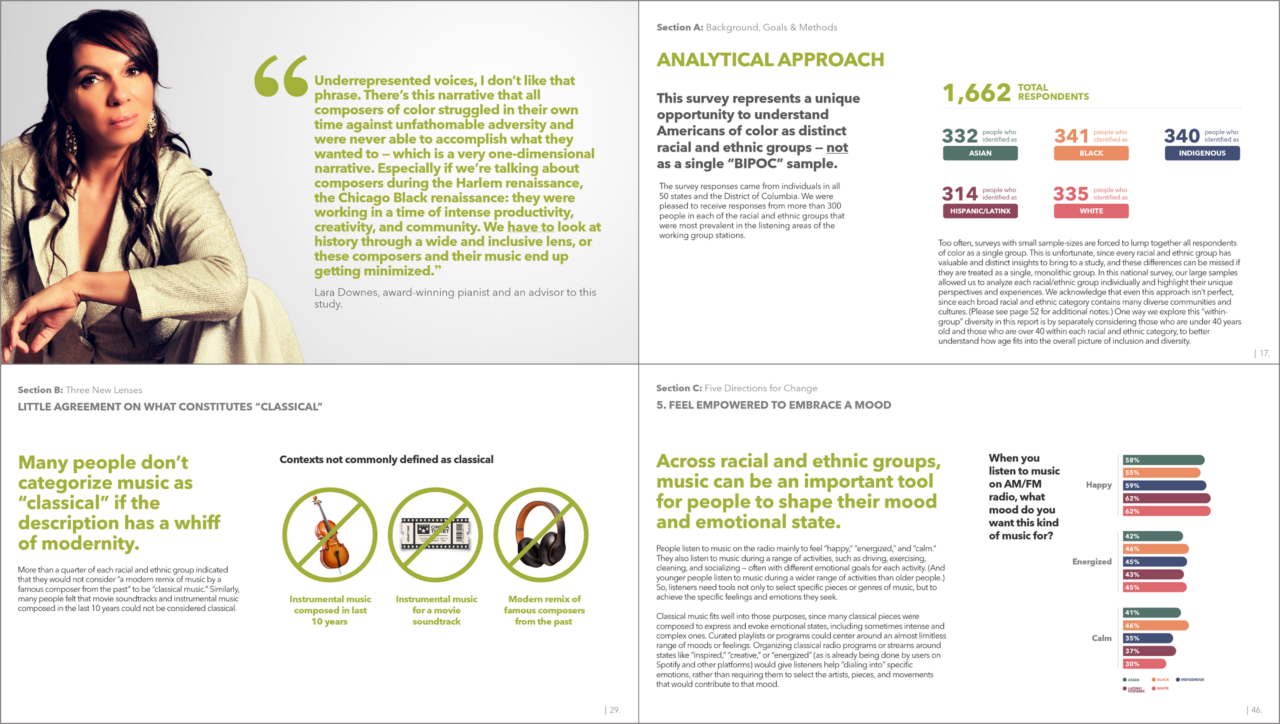News & Notes
‘Taking Another Listen’ to classical music radio for equity & inclusion
My colleagues and I are excited to share our newest report, ‘Taking Another Listen: Audience Research With People of Color To Help Make Classical Music Radio More Welcoming.’
The report offers findings and reflections from national research centering BIPOC voices, and we hope it informs and supports the work of changemakers and movement-builders across the classical music, public media, and arts fields.
REGISTER NOW for a free webinar presenting and discussing this research on Wednesday, May 10, 2023 at 12 noon Pacific / 3pm Eastern. Click to register via Zoom
DOWNLOAD the new summary report.
READ the official press release.
This study was conceived and funded by Brenda Barnes, CEO of Classical KING, Seattle’s classical public-radio station, and was developed and conducted in collaboration with leaders at three other listener-supported stations: Ed Yim of WQXR in New York City (a division of New York Public Radio); Bill Johnson, Josh Jackson and Zev Kane of WRTI in Philadelphia; and Brad Ferguson at KUCO Classical Radio in Oklahoma City. The working group also included Karen Yair at the League of American Orchestras and, as you’ll see in the report, four amazing, generous advisors to the project: Jade Simmons, award-winning pianist, speaker, and podcast host; Quinton Morris, violinist, educator, entrepreneur, and lecturer; Lara Downes, recording artist, producer, curator, and host; and Emilio Alvarez, cellist, composer, broadcaster, and advocate.
I had the honor of working on this study in close collaboration with my colleagues Michelle Ernst, PhD, Matthew Jenetopulos, Peter Linett, and Bayaz Zeynalova.
Personally, I went into the project expecting to hear from the public about the problematic aspects of both classical music and radio — the former because of its origins in Eurocentrism and history of racial and economic exclusion, and the latter because of its limited interactivity and competition from other technologies and platforms. But what we found was more complicated than that, and more hopeful on both fronts.
Most notably, the survey of 1,662 adults across the U.S., evenly split among Asian, Black, Indigenous, Hispanic/Latinx, and White respondents, revealed that Americans of all major racial and ethnic groups listen to classical music at roughly similar rates. This is an important corrective to some longstanding assumptions in the field, and it means that classical radio stations have both an opportunity and responsibility to reach more listeners of color.
(It’s also true that the public defines the genre of “classical music” a little differently than professionals in the field do: in some ways more narrowly, and in some ways more broadly. Read pages 27–29 of the new report for that discussion!)
In the report, my colleagues and I offer three new lenses through which we can view the challenges of audience diversity in classical music radio, along with five potential directions for change to make the field more welcoming to listeners of color — including younger people.
We hope ‘Taking Another Listen’ makes a meaningful contribution to the national dialogue about equity and inclusion in the arts. Please join us for the upcoming webinar, and email me with your questions, comments or ideas for further exploration and action. My colleagues and I would love to think with you about what comes next!
Meanwhile, our deepest thanks to Brenda Barnes, Ed Yim, Bill Johnson, Josh Jackson, Zev Kane, Brad Ferguson, Karen Yair, Quinton Morris, Jade Simmons, Emilio Alvarez, and Lara Downes, all of whom inspired us with their energy, expertise, and passion for equitable change in and through classical music.

